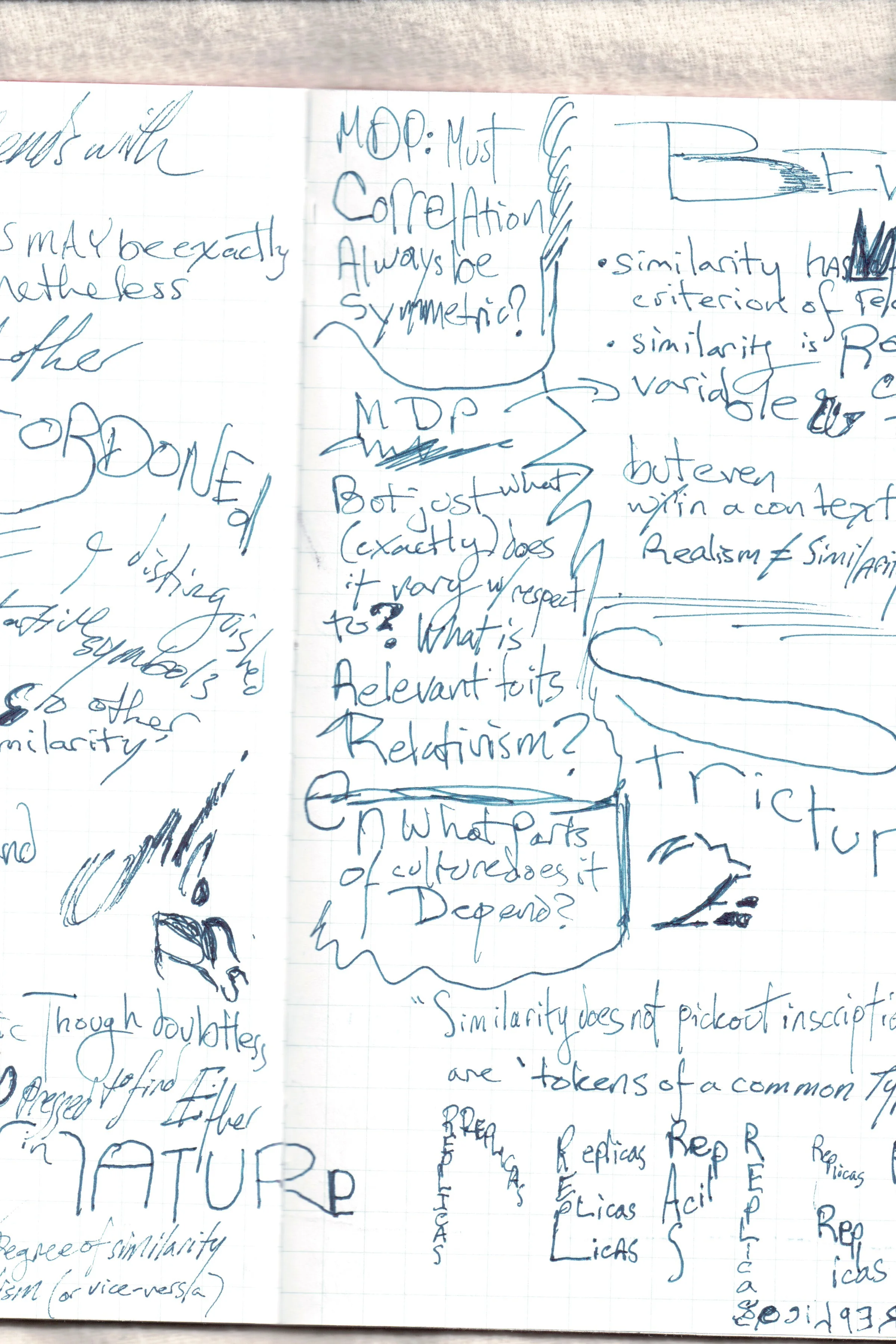The following are a set of notes that I took while reading the materials this weekend. I have compiled some of the notes, making comments on similarity highlighting questions that arise regarding:
- recording
- scanner motion…
- transformations
- brightness,
- contrast,
- contrastboost,
- saturation,
- rotation…
- & smoothness
- acceleration of scanner whole vs. scanner proper,
- relativity,
- dimensions,
- scanner rotation…
as i go.
There are a few jokes in there as well (including places where i contradict myself)
Feel free to read this, or not. In any case, If it can bring any enjoyment, I hope it does.
Warning — its a large file. >200 mb, yep full res scan :) wanna make sure at least some parts of it are legible and that the rest of it is smooth enough to look reasonable.
A further caveat: the title I didn’t realize was a Freud book…i just knew that the “and its discontents” was a phrase and liked that there was some meaning that i didn’t know but that thought i probably agreed with whatever it was enough to reference it…sadly that ended up not being the case, or at least I think there may be ways in which one could apply a freudian style analysis to my work, but given its imprecision I doubt that anyone would find anything more than what they were already looking for. And to be clear i do not wish to align my intellectual tree with his; as I made abundantly clear in the first class of some freudian analysis class; I went to it with Marcelle Friedman…who may be more likely to remember the class than I. But something like social criticism, cognitive science and freudianism or A Freudian Brain in a Durkheimian World[1] or something… I dunno. Given my repeated demonstrably crippling remarks to her arguments since she stated things that were factually untrue(e.g., that we were not able to measure the presence of chemicals in the brain therefore free will? or something like that. Maybe she didn’t make it. But the instance-exemplar that i hold of her would make that kind of argument…that was the most bizarre by far. We’d had PET scans around for a LONG ass time so it would be somewhat reasonable to expect a professor teaching a course on something about neuroscience+Freud would at least know fairly old neuroscience…like easily should have been covered in any book on this. Easily. I just covered it. Or rather. Inject radioactive-tagged chemical, measure the expulsions caused by the increased radioactivity with an array of gamma ray detectors(put a thunk here tagged with “things that happen when radioactive decay occurs”.) These expulsions will go off parallel and will not be disturbed by the environment (if properly controlled)and so if you have the person suitably close from the two midpoints and a ~smooth grid of sensors making a quasi-sphere you can almost guarantee that coincidences of 180˚ are localizable with some error. Some of the native processes release similar gamma rays, but most are endemic to the environment, so you need to ensure that you can localize the correct spot and the precise time lag, since you can determine(if you assume equal speeds) that something in a few seconds of delay was a certain location between the sensors. But they travel fast so you need really fast time tracking, however when you have that, such that you can actually detect the delay, you can put a line between the two points we are assuming and the ratio of arrival delays from the time of firing… alas we don’t have the ability to measure all of those things directly, and i’m not even sure what it would mean if we could. but somehow that theory is morphed into a statistical inference about whether 2 points count as coincidences or not, which means you need to define an error radius for the circle and make some assumptions about the actual time of it occurring(they do a good jobs with the first and an ok job with the second it ends up getting fuzzy and averaged over many hours but it does discriminate functional regions in the sense of we know that these areas are for some reason collecting more of whatever it is that was tagged over time compared to when other things(e.g., L-Dopa → dopamine) are tagged instead. I don’t know how the tagging works. Ok now I’ve covered it as best as I can right now.)I wouldn’t be surprised if she remembered my going on a rant like that in her first day of class. I was a bit of a dick. Sorry about that. But you were teaching things that are known agreed upon falsehoods. And its irrelevant anyway. What theory of free will is based in knowledge about the chemicals being unobtainable? If you know of any please let me know. quantum theories don’t count. But free will is a bunk question. More on that some other day.
Actually fuck it. I’ll just address it briefly now.
A lot of this is owed to Kane, but its the double edged sword of free will (a sword that free will itself falls upon…because it is a mask hanger and “free will” the mask for a whole range of other experiences(clicking the spoiler[2] will lead to a spoiler).
If you are a incompatibilist
either
determinism is true.
In which case free will does not exist, and therefore we cannot hold people morally responsible for their actions as they were just caused to do it by some possibly unknown but knowable cause.
and fuck any free will taken to mean political freedom. I don’t know anything about it…I haven’t thought about it at all…that’s not to say its not important, it could be way more important and indeed I hope that that’s the consequence of this essay is that I can just move on from any concerns about free will to a bunch of way more interesting questions such as how to understand political causation such that it can be understood to be restricting freedom(else why would you care about political freedom if it couldn’t be lost or altered ever). But. nonetheless. That’s not what we’re talking bout here.
or determinism is not true, in which case we cannot hold people morally responsible for their actions as they were not the cause of their actions, rather there was a random generator function that then acted as the realized role of what the possibly unknown but in principle knowable cause played above.
In both cases, the problem is that you end up without moral responsibility. But why should we accept the ties of free will to responsibility if thats what we really want. We want to be able to hold people accountable for those things that they have caused. Ok. Sounds fine. Then what we need is a theory about what aspects of peoples’ actions (since we’re probably only going to be able to describe sub-populations of people at the finest grain) are going to be counted as equatable to that people/{person set} and what aspects of the following events were among those attributable to these cause-aspects that we count the people responsible for.
in some sense, that’s what the legal system is.
A set of rules that are followed by a series of people based on words written down somewhere that are allegedly perfect transcriptions of the court proceedings and therefore based on those court proceedings (in spirit?). we hand down a precedent with an unavoidable attached theory at least that this precedent is related in some way to the case at hand. That is a theoretical statement whether you like it or not. but via these rules, they get applied to people which then applies causal pressure on the person (and here is where i’m gonna stop cause i have no idea how to think about political freedom yet…as i hinted at above)
The point is moral responsibility is all that matters, you never cared about free will. so lets move on with that and ask about the origin of moral responsibility, which now gets us to a question that is fundamentally about causality. That is in what sense are we going to be able to effect a change on the causal system such that we maximize whatever it is that we are trying to make happen when we say morally responsible behavior.












































































